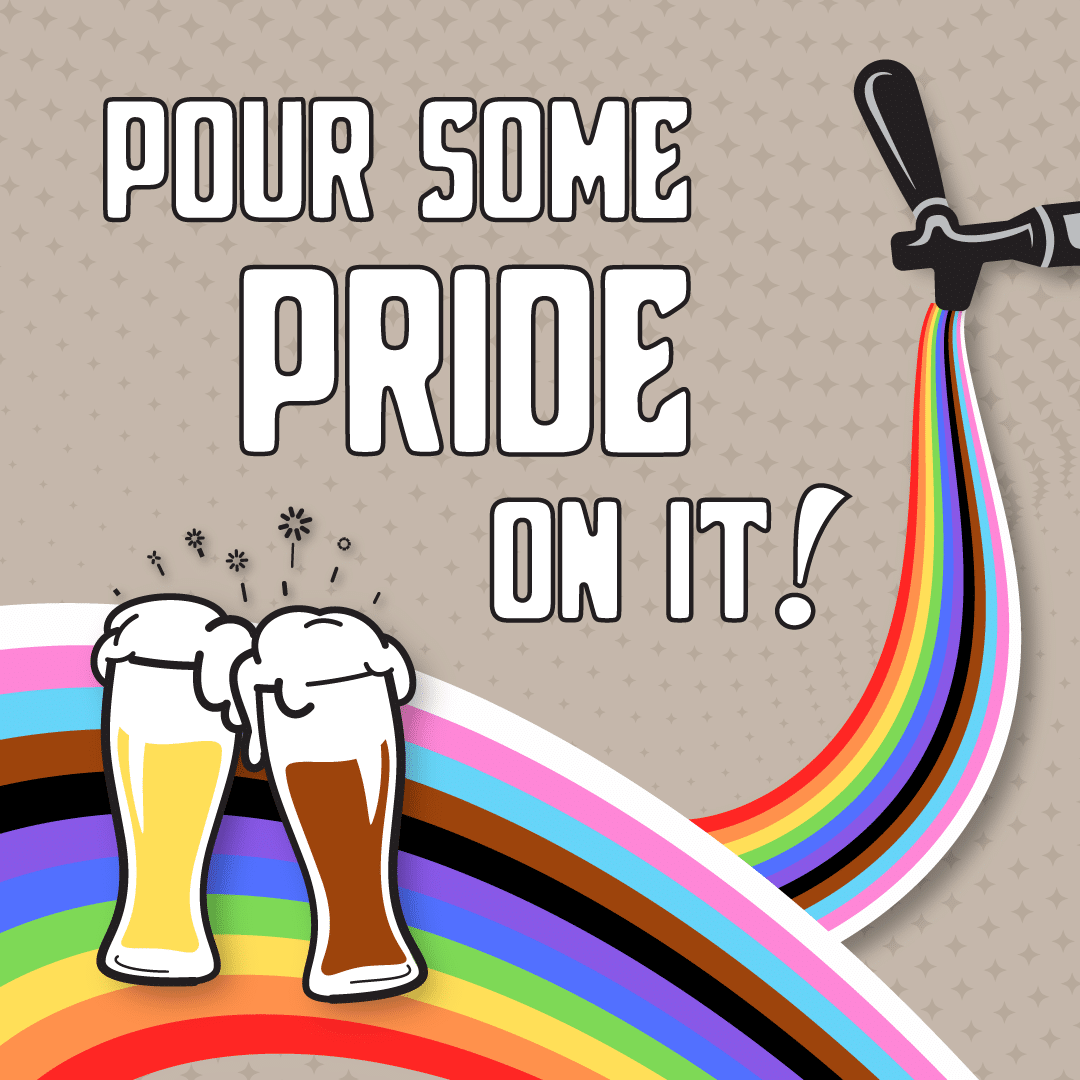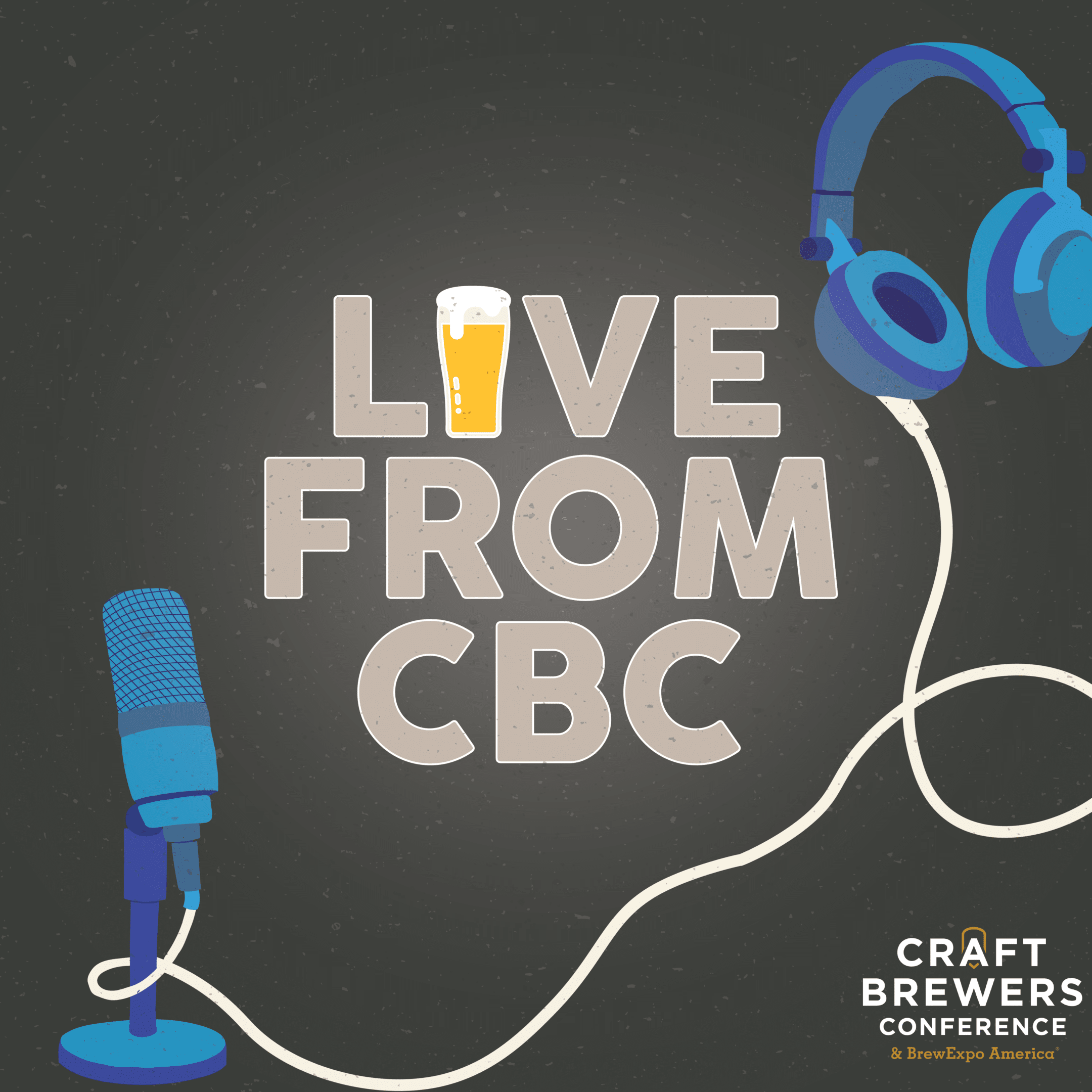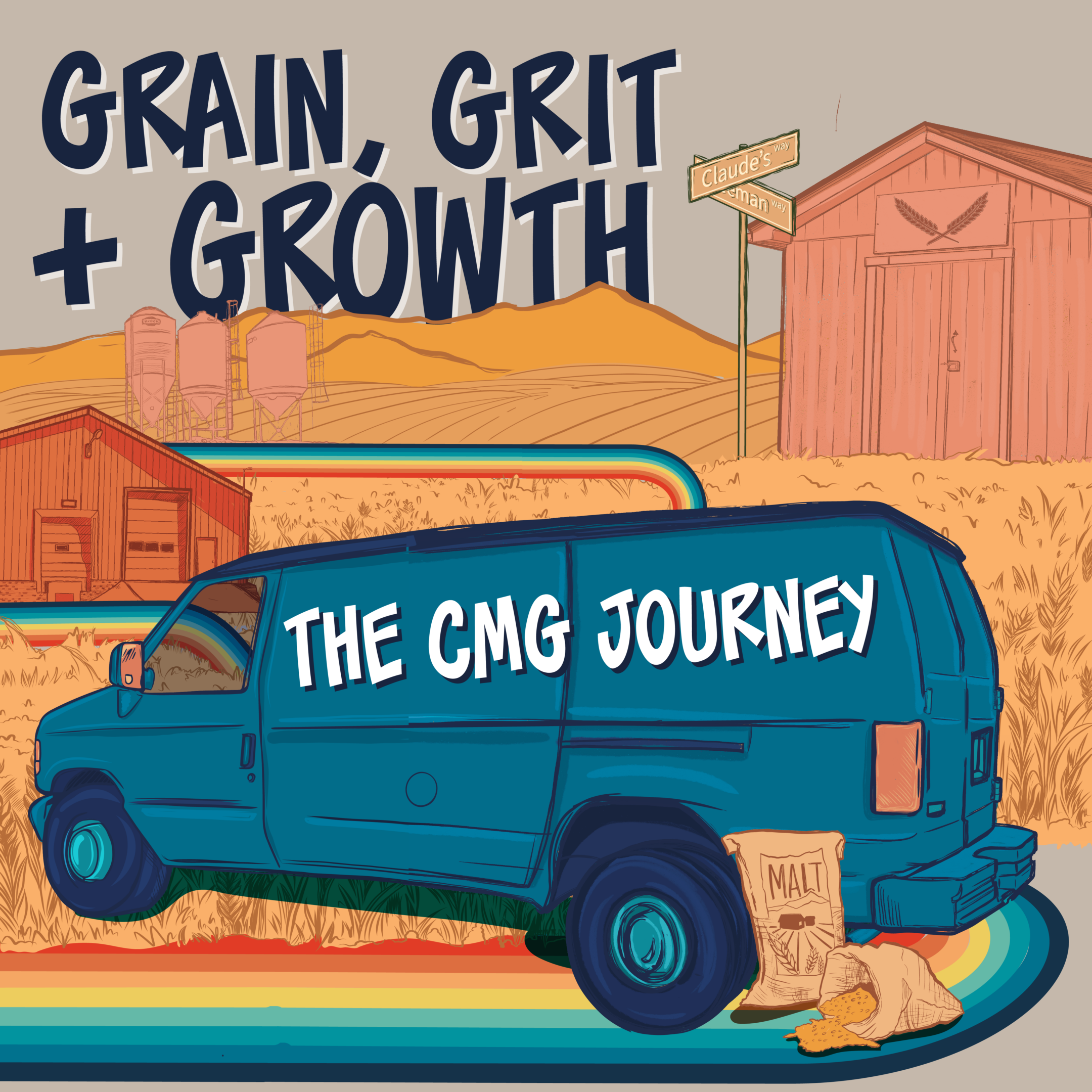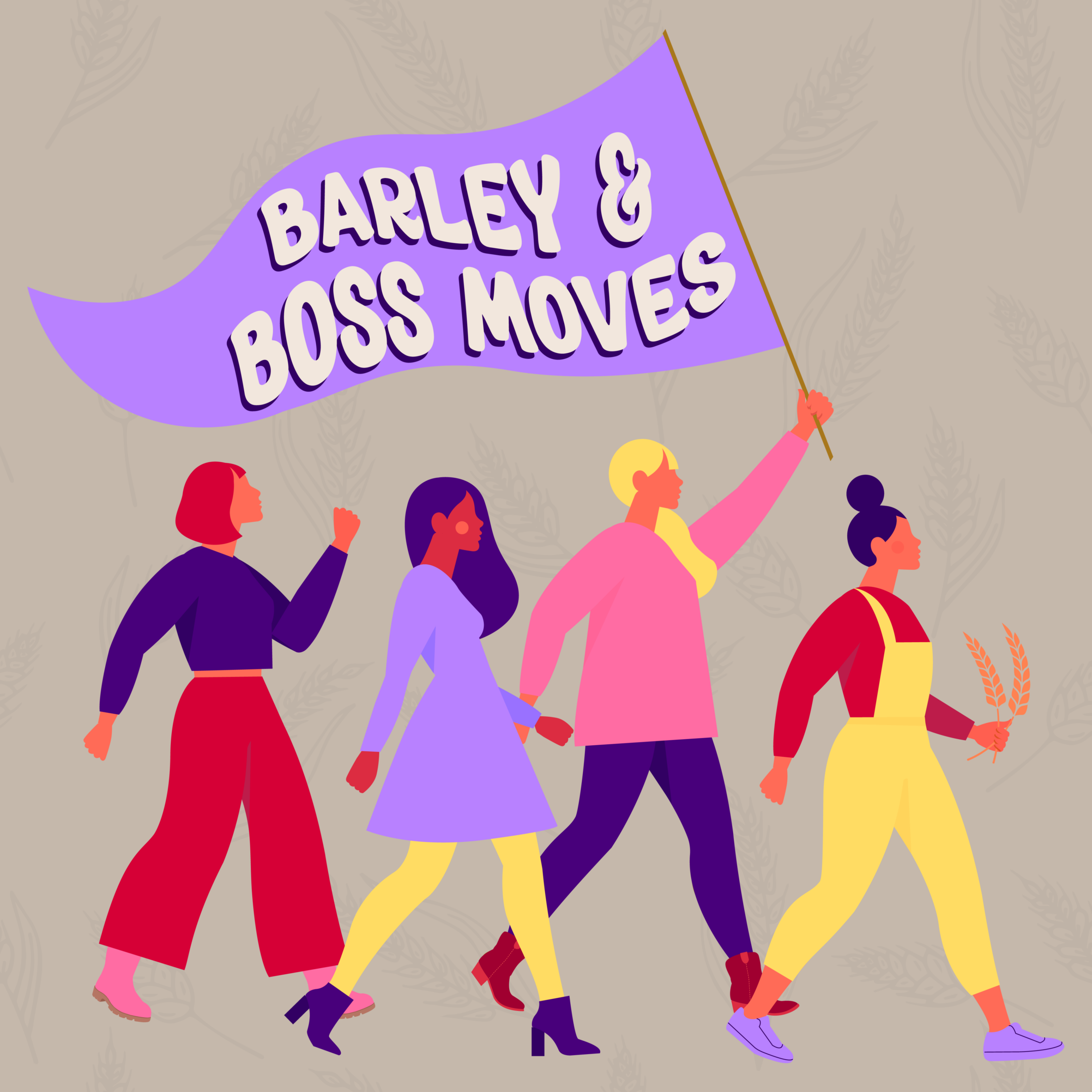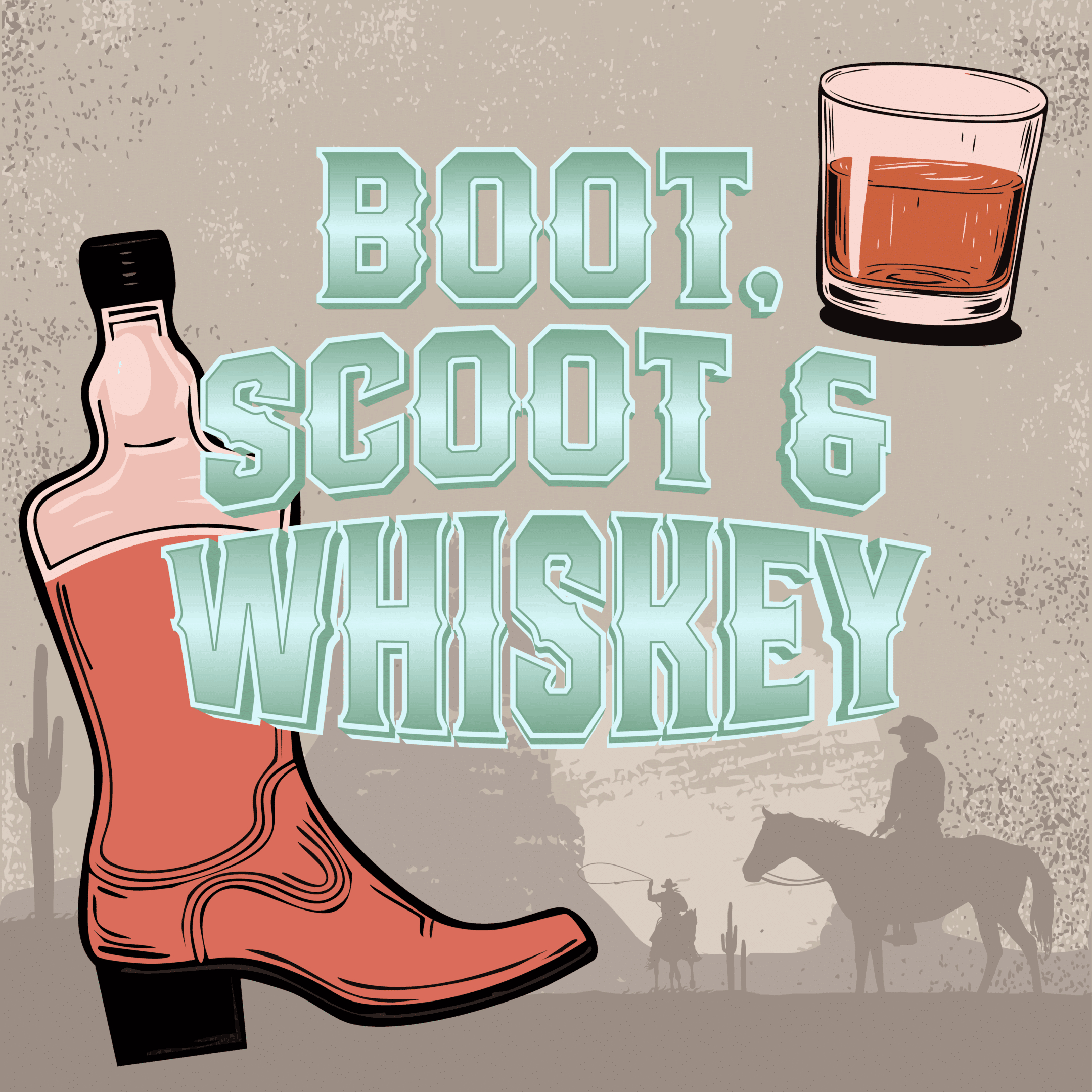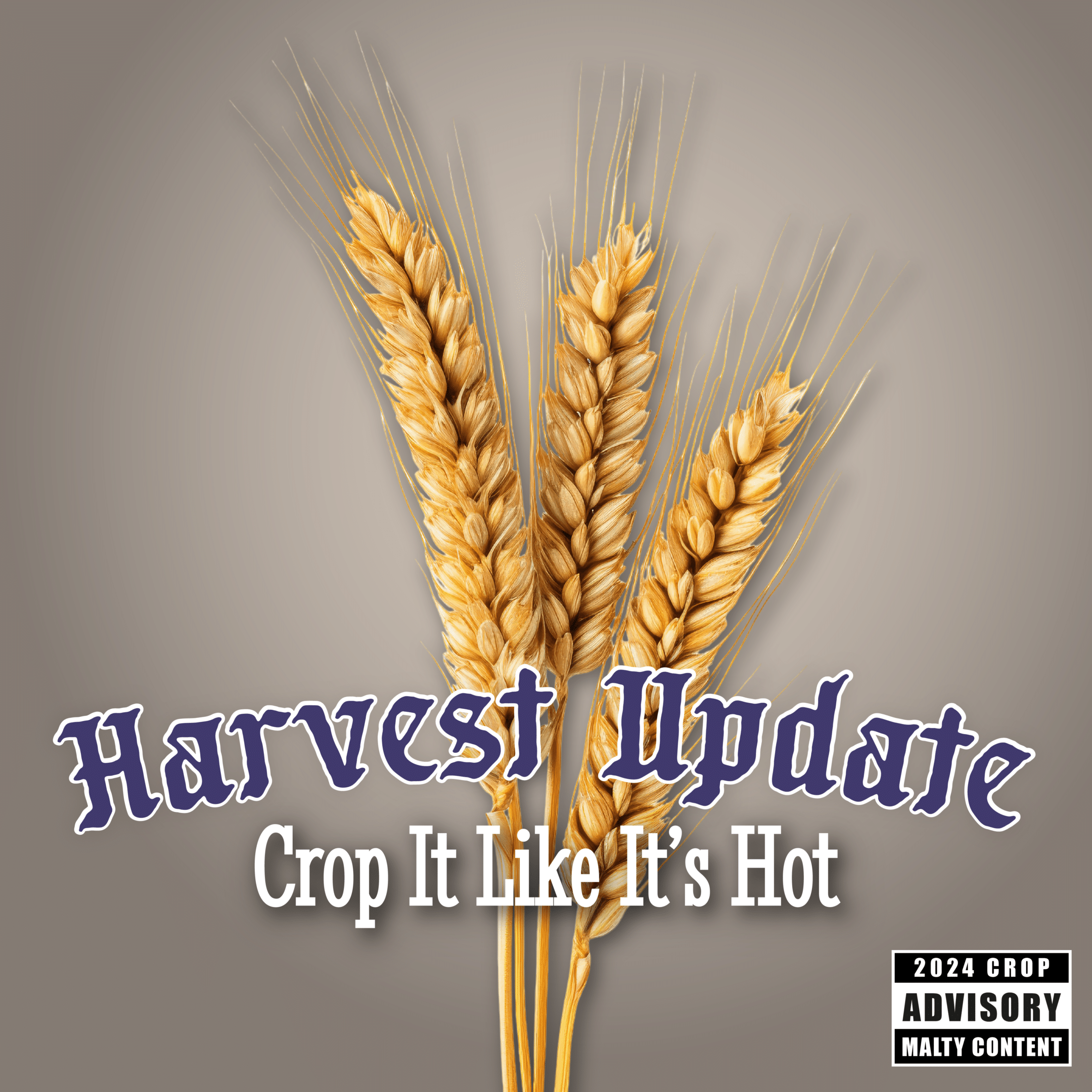
PODCAST GUESTS
James Fawcett

John Kimmich

Bryan Bechard

Timothy Taylor Landlord Clone Recipe
James Fawcett mentions he typically enjoys a Timothy Taylor’s Landlord IPA on this episode of the podcast so we felt it would be fitting to post a clone recipe for it as it can be a hard beer to come by in the US.
Below is a recipe we based on the well-known clone recipe by Gordon Strong from BYO magazine. Timothy Taylor’s Landlord is a traditional English IPA that is more balanced between malt and hops than many of the IPAs here in the states. Gordon’s recipe uses a water profile high in calcium to accentuate the delicious Golden Promise malt. Yeast choice can make difference here and a less attenuative English yeast strain is preferable though the Fermentis S-04 makes a solid beer. If you use it, you may want to increase the mash temperature more to account for the higher attenuation. We went with Gordon Strong’s hop recommendations but any English hop for bittering and your favorite English hop for late additions should do the trick.
Basic Recipe:
OG=1.043
FG=1.010
IBU=34
SRM=6
ABV=4.1%
Grist:
Thomas Fawcett Golden Promise Malt 100%
Hops:
Fuggle @60 minutes
East Kent Goldings @10 minutes
Styrian Goldings @0 minutes
Yeast:
Lallemand Windsor (less attenuation truer to original), Whitelabs WLP037 Yorkshire (less attenuation truer to the original), or for a slightly drier beer Fermentis S-04.
Mash @152f for 1 hour
Boil for 70 minutes
EPISODE 7: STRAIGHT FROM THE FAWCETT
PODCAST HOST:
TOBY TUCKER – DIRECTOR OF SALES, COUNTRY MALT GROUP
GUESTS:
JAMES FAWCETT – PRESIDENT, THOMAS FAWCETT & SONS MALTING
BRYAN BECHARD – PRESIDENT OF WAREHOUSE AND DISTRIBUTION, UNITED MALT GROUP
JOHN KIMMICH – OWNER/FOUNDER, ALCHEMIST BEER
SOME OF THE TOPICS DISCUSSED IN THIS EPISODE:
- James talks about their approach to producing malt and the UK’s ideal climate for barley.
- The tendency of American breweries to use different malts at the cost of defining their brand.
- James reveals his favorite part about doing business with American brewers.
- What John did to land the job as head brewer at The Vermont Pub & Brewery in 1995.
- The particular characteristics of Fawcett’s Pearl malt that makes it John’s obvious favorite.
- The different experiences of drinking the same number of beers in the US versus the UK.
- The guests consider whether it is possible to make a terrible beer from the best ingredient
Transcript, The Whirlpool - Straight from the Fawcett
SEASON 1, EPISODE 8
[STRAIGHT FROM THE FAWCETT]
Host: Toby Tucker, Country Malt Group
Guest: James Fawcett, Fawcett & Son’s Malting
Guest: Brian Bechard, Founder of Country Malt Group
Guest: John Kimmich, The Alchemist
THE WHIRLPOOL
[00:00:11] TT: All right. Welcome to another episode of The Whirlpool. I’m pretty excited about today, and I’ll introduce those folks here in a minute, but when I was growing up, my grandpa had a pool, and he had this giant sign in his backyard, and it was three letters. Welcome to our OOL. Notice there’s no P in it, and I always remember that thing. So, it’s fitting as we jump into what we call the whirlpool. I’ve got a couple rules for my guests. It looks like we’ve got four joining in the whirlpool today.
Number one, no peeing in the pool, as I guess as James would say it, no loo-ing, I don’t think that’s the right term in the pool. Clothing is not optional. Keep your hands to yourself, and I don’t want to see any extra bubbles floating around. It’s all good. All right. Cool. Well, l appreciate several folks coming on and very excited. We got with us Bryan Bechard, Founder of the Country Malt Group; James Fawcett, seventh-generation owner of Fawcett and Son Malting; and John Kimmich with The Alchemist. So happy to have everybody here. How are you guys doing?
[00:01:19] JF: Well, doing good, Toby. Good to hear you.
[00:01:21] TT: Good. Bryan, how’s it going?
[00:01:23] BB: All good, Toby. Thank you, and definitely, thank you, John, for joining us today.
[00:01:28] JK: Happy to be here. I’m excited to have the conversation.
[00:01:32] TT: Very fitting. We have, yeah, John, on the back end of the podcast and BrewDeck episode with both Bryan and James. But we wanted to bring you on specifically to chat with James Fawcett, and I know you guys are a very heavy user of his product. I’d started with Country Malt Group about eight years ago. I got immersed into your beers up in Burlington, Vermont when I’d head up to Champlain to meet with the team up there and quickly realized about the Heady Topper. I’m sure that bartender up at the Hilton there got pretty tired of seeing us come in the door because we pretty much took care of their stock very quickly every time up there but good stuff.
So, John, tell me about how you got started into craft brewing.
[00:02:17] JK: That’s a big question, Toby. It was when I was in college. I was home for a weekend, and I found my brother-in-law’s old dog-eared copy of the Charlie Papazian’s Homebrewing book. It was like that scene in Pulp Fiction when they opened up the briefcase, and the big bright golden light starts shining in their face, and their eyes open, and their jaw drops. It was a moment that I remember distinctly. I had such a curiosity for the craft of brewing like right out of the gate.
Two weeks later, I came home; my brother-in-law had bought ingredients. We brewed my first batch of beer, and that was it. I was hooked. I was finishing up my college education and with a newfound focus. When I got out of there, I worked two jobs until I could afford a car. As soon as I could afford a car, I moved to Vermont and walked into The Vermont Pub & Brewery, looking for a job from Greg Noonan.
The express story, he had nothing. I went down to the Seven Barrel Brewery in West Lebanon. That’s where I actually met Greg. He said, “I can give you a job waiting tables, and you can get as much brewing experience as you want,” and so I took it. As a waiter for a year, I’d go in on my days off, and I’d work for free in the brewery. So I basically worked six, seven days a week for a year until Greg offered me the head brewer job at The Vermont Pub & Brewery, and that was in 1995. That’s where I first came in contact with Country Malt, and Bryan and kind of took it from there. Greg is the one that instilled in me my brewing skills, a lot of my brewing skills, just the way of thinking about the idea of building flavor profiles.
He, of course, was a very heavily influenced by British ales, as was I with the good and with the bad, of course. So as one of your first lessons learned, at least for mine, is that I had a real distaste for Pride of Ringwood yeast and the character that it would bring to beers. So, of course, Greg had his own strain of ale yeast, which is now, of course, known throughout the world Conan, which, as Greg told me, he, for lack of a better term, borrowed from a brewery in England when he was over there traveling. He actually had sanitary containers, and he scooped up a little bit of this yeast out of a ferment that he loved, and that’s Conan came from. There’s been all kinds of – I never confirmed what brewery that was, but there are people that guess.
That was the beginning of it. I mean, geez, there’s many more years of tale after that, and I’m certainly not going to dominate the whole talk with my tale. But that’s where my road crossed with Country Malt Group, Bryan. At that time, we weren’t using Fawcett malt. But, boy, we’re trying all kinds of different British malts.
[00:05:30] TT: Well, it’s fantastic. Fantastic story, and I’m glad that the journey was made by you, especially in your products going into my belly. That’s for sure. We talk about Fawcett and the malt over there, and I don’t think it’s any secret. We talked about it earlier that there are some specific heritage varietals that James and his team procured that a large portion of that comes over to the States into your brewery. You mentioned Fawcett and the discovery, but tell me a little bit more about that and your kind of connection with Fawcett & Son’s malts and in the products you use in your everyday brewing in your products?
[00:06:06] JK: Sure. The big time was as soon as I started our pub. So when Jen and I started The Alchemist in 2003, that’s when I started brewing with Fawcett Malts. Over the eight and a half years that we are running that, I brewed every batch of beer that came through that place, and so I had an intimate knowledge of the ingredients, and I had basically a playground to try anything and everything that I wanted.
When I started making Heady Topper in particular, that was very early in 2004 after we had opened the pub. And over those eight years of brewing that, it went through so many changes in recipes. I mean, I used British malt, German malt, French malt, American malt, this, that, different hops, different techniques, everything. It was extremely helpful to be able to do that in my own little laboratory there and figure things out.
It was really trial and error, and it was, in particular, the Pearl that absolutely was the key to the entire thing. All of my IPAs use Pearl malt. Some like Vocal Banger has some German Pilsner malt blended in there. But for the most part, it’s Fawcett’s Pearl. To me, it was the incredible flavor that I was able to draw out of these, the total lack of astringency and huskiness that was so common with American malt. It wasn’t as simple and one-dimensional as some of those German malts could be. It didn’t have the heavy caramel kind of notes that I would pick up from these French barleys and even compared to other classic English or British strains or varieties. Pearl was the one. Pearl was the magic ticket where it gave you that beautiful malt character that was just the ideal base for showcasing these hops.
I’ll switch it up every once in a while. We’ll try things. But, boy, I mean, there’s nothing like it, in my opinion. James, I bet that is music to your ears.
[00:08:24] JF: Yeah. It’s fantastic, John, and I’m very grateful that you’ve made this amazing discovery, and I think Pearl is a very nice variety of barley. I think it’s very interesting that you have discovered all sorts of complexities with it and the malt character that it brings to a beer that perhaps makes you have to work a little bit harder with your hop profiles if you like to get the balance that you need. I think the one thing that I would say we’re very lucky in the UK with our climate; it does allow us to grow very good and consistent malting barley. It is bred very carefully for its malting qualities, and I think as a business, and this will come into a later conversation perhaps with Bryan, and I is that we still do things in a very traditional manner.
So it takes me 12 to 13 days to make a batch of Pearl malt, and that is a three-day steep, it’s a seven-day germination, and it’s a three-day kilning process that’s very, very gentle. Everybody else I know in the world makes malting half the time, and I think they get half the product. But that’s me, and I’m absolutely thrilled that the brewers out there that are prepared. I don’t want to talk about it too loudly but are prepared to pay a little bit extra to get the best ingredients, because, at the end of the day, you are going to be judged on your product, and people are going to come back to you hopefully time and time again when you get it right.
I think one thing that has really interested me about your commitment to Pearl is that it goes into a lot of your beers, and I find it very interesting when I visit a lot of American breweries that they have bags of everybody’s malt under the sun and they do an awful lot of creative brewing, always trying to do something different but perhaps lose that sense of trying to build their own brand. If you’ve got an absolute base malt that is something you understand that gives you the key building block for your beers, then you’re some way to building a brand, which I think is a very good place to be in business.
[00:10:44] JK: Well, it’s interesting that you say that too because for one thing, of course, mine and Jen’s philosophy, when we’ve been doing The Alchemist, is that, no matter what, the quality has got to be there. That’s our end of the bargain for being a purveyor of a product and putting it out there for sale. If we do our end of the deal and put it out the door in perfect condition, then we have no worries.
When you do see these breweries, and like you said, you see all these different barleys, and they’re brewing everything under the sun, at the pub, I used to have 10, 12 different beers on tap at a time. So, yeah, in a sense, it was a similar thing.
But I think that that’s a lot of what these small craft breweries are missing. You can’t ignore your predecessors, and a lot of them have a very short memory. A lot of these young brewers have a short memory. They don’t think about big beer as having been not only a part of the industry but the entire industry for a long time and that they are very, very good at what they do. You may not like their beer. You may not respect their beer, but you’d be a fool to not respect what they have accomplished. There was a time when we transitioned over into the – When the pub got destroyed, we started producing just Heady Topper at the time, and people would kind of like, “Oh, all you make is Heady Topper.”
It’s kind of silly because there are so many craft breweries out there that you don’t even know it’s their beer. You’ll look at it on the shelf, and you can’t even find their brewery name on there. They think that just a beautiful artwork and this and that.
For us, as craft, as we are and as focused as we are on that, I’ve got a degree in business logistics in college. So if you’re not going into this with the proper business mind, you’re really going to set yourself up for failure. That idea of brands, I think, is quite often underestimated, and I think that this COVID reinforced that our philosophy on building brands is the way to go. So it hits, and we fall back on our big brands, the Heady Topper and the Focal Banger, the beers. People craft beer drinkers, any beer drinkers, any beverage drinker, people love to identify with that product or that brand or that anything. It doesn’t need to be beer. It could be anything.
[00:13:38] JF: I think the thing about a brand is, as you say, it’s what people like to identify with. But also, it’s what they learn to expect, and therefore it’s a consistency, and that’s the challenge, I think, for any brewer. Because certainly, in the UK, if you come across a really nice beer in one part of the country and you see it on a bar in another part of the country, you have an expectation that it’s going to taste the same.
It’s got to taste the same week in, week out, because that is what people are looking for, and that is where I can think of some iconic beers in the UK where branding is almost everything, and the most successful guys are the ones who can replicate those flavors time and time again. That is the skill in the brewing of the product with a consistent raw material. Would you agree with that?
[00:14:34] JK: Absolutely. When we witnessed it, when COVID hit, our beer – we went from 70% of retail to like zero retail, and it all went to wholesale. When we started distributing into these markets that we had for years just been doing tiny little drops when we could, maybe once a year, they’d get four pallets of beer. But we started these relationships because we’ve said if anything if the shit goes down and we need to distribute, we need to have these relationships established.
When we send our beer out there, people trust; they understand. They know what we do. They know what we’ve built in influencing the whole world of distribution, cold chain distribution so that they know that when they see our beer on a shelf in San Francisco and they look at it and these beers that we were sending out during COVID, literally they would be on the shelves in California five days after they were packaged, and they’d be sold out a day after that. So people are at home in the Bay Area, in LA, in these different markets drinking seven-day-old Headys and Focals, and it’s that image. You recognize the can, and you’re damn sure that it’s going to be killer when you open it up.
Everybody’s always chasing something different. I’ve been trying to make something wacky. It’s like the most choices there are; the more people want a safe choice. They don’t want to blow 20 bucks and dump three of the four-pack.
[00:16:14] JF: Well, that’s the point, isn’t it? I mean, the more of that there, you’ve got customer confusion. They don’t know – I mean, I’ve drunk some pretty crazy beer in the States, and I didn’t know what the hop is, but it is a very great fruity hop. I thought I was drinking fruit juice, but it wasn’t. It was a 10% beer, and it made a mess of me. They always do, and I never learn.
[00:16:42] JK: Oh, yeah. [inaudible 00:16:42].
[00:16:43] JF: I’m not sure I’m looking for it again, though.
[00:16:47] JK: When I went over to the UK, it was amazing. I’d go out to pubs, and I could have four or five, six beers, and I still was together. So it made me feel like a pro.
[00:17:01] TT: Now, John, am I correct in saying that you –
[00:17:02] JF: I was going to ask you. Can I ask you, John?
[00:17:04] TT: Go ahead.
[00:17:05] JF: When did you come over to the UK?
[00:17:07] JK: We came over – I did a collaboration with Adnams. Geez, that had to be five years ago at least, and it’s funny because I just got an email from Fergus Fitzgerald, their brewer. They’re reaching out to do it again. With all of this, it’s probably not going to happen this year. So, yeah, we came over and brewed a batch like a collaborative thing. Then they sent it out to all their pubs. It was great. We had a really great time. We stayed in the Cotswolds for a couple of days.
[00:17:38] JF: A pretty place.
[00:17:39] JK: Oh, my goodness. So we loved it, but I never got the beer because it didn’t come out until three, four weeks later. At that point, I had a nine-year-old, and it’s like I’m not flying back just to go drink.
[00:17:51] JF: Drink a beer.
[00:17:53] JK: Yeah. Of course, you can’t ship it because you guys have all these wacky rolls. You can’t ship alcohol and stuff, so I never even got to try it but someday –
[00:18:03] JF: And you were in the UK, and you never came to see me, so that’s a disgrace.
[00:18:09] TT: Well, let’s put that on the calendar for next time, right, though.
[00:18:12] JK: I had five days there, and two of them were in this brewery, and I could not convince the rest of my family to do yet more brewery tourism.
[00:18:23] TT: You might want to go see James without the family.
[00:18:26] JK: James, I mean, that could be a conversation later, but that was – My plan was hopefully like in June to come over and visit, but I just don’t know if that’s going to be realistic. It might have to just get bumped a year. But, boy, the dream is that that is our next trip to the UK is you are our destination.
[00:18:48] JF: I’ve had some of your countrymen pulling rakes through floors. I’ve had them loading salad and boxes, getting covered in water, roasting malts. I mean, the one thing I love more than anything about doing business with Americans is that I really enjoy the passion that you guys bring to what is a very ancient craft, a very ancient industry.
I think the old world has forgotten about the passion that we all need to make businesses work. I thank my lucky stars that I spent four years wasting my life in Chapel Hill, North Carolina, doing all sorts of things I can’t talk about on this podcast but I think certainly taught me how to appreciate the get-up and go of Americans. It’s amazing how much you guys can pack into one day. Half of which is legal and half of which isn’t.
[00:19:49] TT: James, we miss you over here, buddy. We miss you.
[00:19:51] JK: Thank goodness, for the most part, it’s all legal here again. Think have changed.
[00:19:58] TT: Well, John, before we depart, anything you want to chat with James? Any questions you want to ask James while we got him? It’s not often we get to connect with him.
[00:20:08] JK: It would end up being an hour conversation. I mean, I can’t tell you, James, how much I look forward to meeting in person and seeing that operation over there because only then will you even be able to really try my beers because I’ll bring them with me. But, boy, I mean, way do I pour like Luscious for you. I mean, it’s a British Imperial Stout that I make that will just knock your socks off, and it’s Fawcett’s –
[00:20:35] JF: Send me some for Christmas.
[00:20:38] JK: It’s Fawcett’s malt through and through, and let me tell you. The Fawcett’s brown malt, you want to talk about one of the most – I don’t know if it’s underrated. I don’t know. I never hear of other people using it, but I lean heavily on that malt for even in my Belgian beers. That malt throws the most incredible dried fruit like the dried cherry kind of deep, dry, tasty fruit character to a beer. It’s incredible. I’ve made brown ales that are heavy on that, and it’s an incredible nutty, fruity character that you get just from that barley.
When we start blending, and it’s a very complex malt feel on this beer, and I feel like we’re really at this point – We’ve been brewing it for almost 10 years now, and only now I think are we really nailing it, and so you’re going to flip when you have that.
[00:21:39] JF: I can’t wait, John. I think just this is another interesting thing that I picked up on my travels, especially in North America is that, again, when you’re using a complex malt bill or grain portfolio in a beer, it’s always very difficult to work out which one is actually making the most significant contribution. I think it’s a building process, isn’t it? It’s like any scientific experiment. You keep – Start it simple. Then when you make it more complex, you know exactly how many kilograms of what are changing that flavor profile.
I’ll tell you what. You can’t go wrong. You’re never going to produce a shitty beer with really good ingredients. It’s almost impossible.
[00:22:26] JK: That’s not true, James. I have – Let me tell you. I cry a little inside when I will try a beer that’s got your malt or these incredible hops from some amazing farm. I’ll try these beers that are garbage, and it makes me cry inside because it’s like that. So that barley went through its whole life cycle and then through the whole process and all the way over here, and this is what they did to it. It’s a crime, really.
[00:23:01] JF: Yeah. I guess that I didn’t – I explained myself terribly clearly. I was really talking about malt, rather than what people can do with that.
[00:23:10] JK: Yeah. You give it to me and, yes, I would agree with that statement. If I could pick who you give it to, I could agree with that.
[00:23:19] JF: I get that.
[00:23:21] JK: It’s a cry and shame sometimes with what people produce nowadays. You can only hope that – I’d never want to see the industry damaged by the loss of breweries. But at some point, it’s got to happen. There’s got to be a moment where people really figure it out like, “Okay, this is pretty terrible, but this is really good.” It seems like, by default, so many terrible breweries are still hanging on. It’s kind of a crazy thing.
[00:23:52] JF: Can I ask you a question because I’m beginning to get a feeling in the UK that if you like the weaker guys as COVID continues and I don’t believe we’re going to see the back of it for at least possibly eight or nine months in any meaningful capacity or somewhere where we can relax, and I think certainly in the UK we are going to see a number of breweries disappear because their route to market is too complicated.
They haven’t got that quality brand behind them. They haven’t established themselves. I believe in the UK, the guys who are going to emerge from this initially weaker but will get strong very, very quickly are the people who’ve proven over the last 10 or 15 years that they really know what they’re doing. I think there’s probably every likelihood of that happening in North America too. Would you agree with that?
[00:24:46] JK: Well, I got to say I definitely – When COVID hit, that as my first instinct. I mean, for two years before that, I was saying, “It’s coming. It’s got to happen.” There will be a bubble burst here, and you will see breweries go out of business because it’s just – You cannot maintain this number of skews, individual beers on the shelves. It can’t sustain itself, and I see larger, longer-established breweries that continue to grow and grow, and they’re like, “We’re in two new states. Hey, now we’re up to 25 states.”
When I read that, it’s like, “Oh, boy.” That’s the kind of brewery that’s going to disappear because you hit these new markets out of me. It’s because you’re producing the beer. It’s not selling enough in your current market, so you hit new markets. If those new markets don’t embrace you, now you’ve doubled down on your failure. At some point, that will catch up, and it will happen quick.
I think COVID showed us that when you turn off the spigot, boom, it piles up. So any brewery that it can happen within a month all of a sudden. Geez, people aren’t buying our beer anymore. Boom, boom, boom, it stacks up, and people start returning it, and then you’re doomed. I think so, yes.
But here in the States, I think all of the PPP money and all of the federal money that is being poured into the economy is propping up a lot of these weaker breweries and businesses in general. Everybody that has ever gone to business school has heard the phrase, “If you all start a business in this room, 90% of you will be out of business within the first three years.” If you can make it three years, your odds of lasting long-term go up a lot.
So I think that what you’re seeing is an artificial reality. You’re having breweries that maybe were in a bad spot, and all of a sudden, there’s this influx of cash that extends it another four, six, eight months. So I think like we’re kind of coming into that zone now, so eventually, it is bound to happen. I still read about very large craft breweries.
I just read about one that was making like 30,000 barrels a year, and it was all draft. So just like that, they’ve pivoted. They’re trying to package it, but they’re only packaging the brewing a fraction of what they used to brew. That’s not sustainable. So there are so many things, and now the can crunch that’s coming with the canned supply chain, if you are a newly pivoted brewery into cans, you’re the low man on the totem pole.
[00:27:49] JF: Are there a shortage of cans at the moment?
[00:27:51] JK: That’s what everybody’s talking about, and it’s happening, and there are so many breweries trying to pivot the cans because their draft accounts all closed. Boy, I’m just glad I’m not in that position.
[00:28:05] JF: I’ve got a technical question for you, John.
[00:28:08] JK: Yes?
[00:28:08] JF: If three years is the time you go out of business when you start up, if you survive that first three years and you get to 211, where’d you end up after that? I’m feeling pretty damn old this year.
[00:28:27] JK: Now, that’s something that I would be so thrilled if that ever happened with The Alchemist. The idea of that family legacy is incredible. And here in the States, it’s kind of – Well, I mean, it’s not unheard of because our country’s just not that old. So that’s one of the things that really blew my mind when we came to England. I forget where we were. It was in one of those little towns out in the Cotswolds. It was like Stonewold or something like that, and there was a pub there, and the established date above the front door was 987. I stood there looking at that like, “Holy shit.”
[00:29:15] TT: You’re like, “Is it missing a one?”
[00:29:17] JK: People have been coming in here doing the same thing for over a thousand years. It’s like that kind of history. It’s hard to even comprehend, especially if you’ve never traveled to Europe. For anybody that hasn’t been to Europe, you can’t even comprehend to that when you’re standing looking at buildings that are that old. That kind of history just doesn’t exist here. So, boy, that would be awesome. We only have our one son, and at age 16, he says he has no interest in the brewing industry, but I’m [inaudible 00:29:51].
[00:29:52] TT: That’ll change.
[00:29:53] JK: That’ll change. I’m hoping that by the time he hits like 25 or 30, that that little light bulb goes off, and he’s like, “Hey, this is actually pretty cool. I might want to do this.” So fingers crossed.
[00:30:05] JF: Any chance of you having another one, John? Just to build them up. You need an heir.
[00:30:10] JK: Let me tell you. If Jen comes in and tells me she’s pregnant; it’s going to be a bigger conversation than that. Then what are we going to name him?
[00:30:21] TT: Well, John, I really appreciate you jumping on. This has been fantastic. And on behalf of Country Malt Group and Fawcett & Sons, and James and Bryan, we appreciate your business.
[00:30:32] JF: Very much.
[00:30:32] TT: Obviously, when this COVID stuff goes away, we’ll get you and James in touch and James and I. I’m assuming I know James will take good care of you over there and have you look at the facility and kind of develop that relationship there.
[00:30:44] JF: Toby, just before you wrap up, I just want to tell John that the Winter barley this year was the pick of the UK Crop, and we’ve got some very nice Pearl and plenty of it. We are intending to keep that variety going for as long as we can.
Halcyon’s another winter variety. I know Greg Noonan was a great fan of Marisota because I’ve got a letter from Greg in my boardroom, thanking Bryan Bechard for introducing him to our malt back in the day. But that’s perhaps for another conversation. But you’re concerned. I really hope and pray your business continues to flourish. Stay safe during COVID. We will meet thereafter and drink some really good stuff, hopefully, yours and some that’s made over here when we get the first opportunity. In the meantime, we’re going to carry on doing things the way we know-how. I hope that reassures you.
[00:31:41] JK: Thank you, James, and it’s an honor to be able to brew with your barley and everything that your family’s built over all those generations. I really look forward to when we finally get to meet in person.
[00:31:52] TT: And for those listeners, absolutely go out at the retail stores and look for The Alchemist. They got some fantastic products and support John and his group up there. If you’ve really never had an experience to have a beer made with Thomas Fawcett, they’re fantastic products. Take an opportunity to find The Alchemist in your store or some of their products, and support the craft beer. All right.
[00:32:15] JF: Fantastic. Awesome.
[00:32:17] TT: I look forward to having everybody join us on the next whirlpool and another episode of The BrewDeck, and that’s it for today. Cheers. Thanks a lot.
[END]
